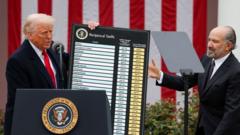
US President Announces Sweeping 10% Universal Tariff: Global Economic Implications Loom
In a move that has sent shockwaves through the global financial markets, the US President has announced the implementation of a universal 10% tariff on all goods imported into the United States, effective April 5th. This unprecedented decision, revealed earlier today during a press conference at the White House, marks a significant departure from established trade policies and is expected to have far-reaching consequences for international trade relationships, domestic consumers, and the global economic landscape.
The Rationale Behind the Tariff
The President's justification for the universal tariff centers around bolstering domestic manufacturing, protecting American jobs, and addressing what the administration perceives as unfair trade practices employed by various countries. Specific claims were made regarding intellectual property theft, currency manipulation, and state-sponsored subsidies that disadvantage US businesses. While detailed evidence supporting these claims was not immediately provided, the administration promised a comprehensive report outlining its rationale in the coming days.
Key Details of the Tariff Implementation
- Effective Date: April 5th
- Tariff Rate: 10%
- Scope: Applies to all goods imported into the United States from all countries.
- Exemptions: As of the announcement, no specific exemptions have been outlined. However, the administration indicated a willingness to consider exemptions on a case-by-case basis, contingent on negotiations and reciprocal trade agreements.
Potential Economic Consequences
Economists are divided on the potential impact of the universal tariff. Supporters argue it will incentivize domestic production, create jobs, and reduce the US trade deficit. They believe the increased cost of imports will encourage consumers to purchase American-made goods, stimulating economic growth within the United States.
However, critics warn of potential negative consequences, including:
- Increased Consumer Prices: The tariff will likely be passed on to consumers in the form of higher prices for imported goods, potentially leading to inflation and reduced purchasing power.
- Retaliatory Tariffs: Other countries are likely to retaliate with their own tariffs on US exports, harming American businesses that rely on international markets. This could trigger a global trade war, significantly disrupting international commerce.
- Supply Chain Disruptions: Many US businesses rely on global supply chains to produce goods. The tariff could disrupt these supply chains, leading to increased costs and production delays.
- Reduced Economic Growth: The combined effects of higher prices, retaliatory tariffs, and supply chain disruptions could significantly slow down economic growth both in the United States and globally.
Industry Reactions
Reactions from various industries have been swift and varied. The National Association of Manufacturers expressed cautious optimism, stating that the tariff could provide a level playing field for American businesses. However, the Retail Industry Leaders Association strongly condemned the move, arguing that it would disproportionately harm consumers and small businesses.
The agricultural sector has voiced significant concerns, particularly regarding the potential for retaliatory tariffs from key trading partners. Farmers fear that these tariffs could decimate exports and severely impact their livelihoods.
Global Response
The international community has expressed widespread concern and disappointment regarding the US tariff announcement. Several countries have already indicated their intention to challenge the legality of the tariff under World Trade Organization (WTO) rules. The European Union has warned of swift retaliatory measures, while China has called for dialogue and a multilateral approach to resolving trade disputes.
Looking Ahead
The coming weeks will be crucial in determining the long-term impact of the US universal tariff. Negotiations between the United States and its trading partners will be closely watched, as will the response of global financial markets. The effectiveness of the tariff in achieving its stated goals remains to be seen, and the potential for unintended consequences looms large. The global economy braces for a period of uncertainty as the implications of this bold policy decision unfold.
Further updates will be provided as this story develops.
